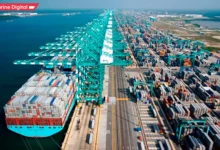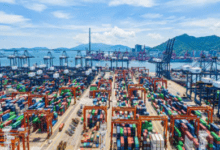
10 Importance Of Commerce In Nigeria
Importance Of Commerce In Nigeria – Commerce plays a pivotal and important role in Nigeria’s economy. As a West African country, Nigeria is a trying all possible best in leading commercial hub in the region, and its economy largely depends and focuses on the trade of goods and services. Commerce in Nigeria refers to the buying and selling of goods and services, either within the country or between Nigeria and other countries.
The importance of commerce in Nigeria cannot be overstated because it is overrated. It is the backbone and means of survival for people in the country.InformationGuideNigeria
👉 Relocate to Canada Today!
Live, Study and Work in Canada. No Payment is Required! Hurry Now click here to Apply >> Immigrate to CanadaThe country’s economy creating jobs, generating revenue, and driving economic growth. Nigeria’s large population, strategic location, and natural resources make it an attractive and interesting market for local and foreign investors to invest in commercial activities.
The commerce sector in Nigeria encompasses various industries, such as agriculture, manufacturing, mining, and services. These industries contribute significantly to the country’s Gross Domestic Product (GDP) and provide a basis for sustainable economic development.
Moreover, commerce as has enabled and make Nigeria participate in the global economy, facilitating international trades and strengthening diplomatic relations with other countries. It has also created more opportunities for entrepreneurs for easy businesses and small businesses to thrive harder, resulting in increased income and improved the standards of living for individuals and families in the country.
Understanding Commerce in Nigeria
Commerce in Nigeria refers to the buying and selling of goods and services, both within the country and with other countries. It accommodates various industries, such as the agriculture, the manufacturing, mining, and services. The commerce sector is an essential part of Nigeria’s economy, driving growth, creating jobs, and generating revenue.
Nigeria’s strategic location, large population, and abundant natural resources make it an attractive market for local and foreign investors. The country has a vast consumer market, and its booming middle class is increasing and multiplying many demand for goods and services.5 Best Mtn Wifi in Nigeria and their prices
Commerce in Nigeria can be conducted and carry out through various channels, including physical markets, e-commerce platforms, and international trade. The country’s infrastructure, such as seaports, airports, and roads, supports the movement of goods from one place to another.10 Importance Of Commerce In Nigeria
Furthermore, Nigerian commerce has faced several challenges, including poor infrastructure, corruption, and inadequate policies. However, the government has implemented measures to address these issues which should be done immediately, such as the creation of the Nigerian Investment Promotion Commission and the establishment of the Nigerian Export-Import Bank.
Read Also: 10 Economic Importance of Kolanut in Nigeria
👉 Relocate to Canada Today!
Live, Study and Work in Canada. No Payment is Required! Hurry Now click here to Apply >> Immigrate to CanadaA Historical Perspective on Nigerian Commerce
Nigeria’s commerce history dates back to pre-colonial times, when trade routes were established to facilitate the exchange of goods between different regions.10 Best MTN Routers in Nigeria and their prices
These trade routes connected communities within Nigeria and also extended to other West African countries, as well as North Africa and Europe.
The arrival of European traders in the 15th century saw the beginning of a new phase in Nigerian commerce. The European traders established trading posts along the coast, which gave rise to new commercial relationships to interact easily between Nigeria and Europe. During this period, slaves, palm oil, and other commodities became popular exports from Nigeria.JAMB Portal
After Nigeria gained independence in 1960, the country began to focus on developing its commerce sector. The government implemented policies that encouraged local and foreign investment, and this led to the growth of various industries, such as agriculture, manufacturing, and services. This period saw the rise of many successful Nigerian businesses, such as Dangote Group, which has become a major player in the African commerce scene.
Despite its growth, Nigerian commerce has faced many challenges over the years, such as corruption, insufficient infrastructure, and political instability. However, the sector remains vital to the Nigerian economy, and the government continues to implement policies aimed at promoting sustainable economic growth.
Read Also: The Importance Of Democracy In Nigeria
10 Importance Of Commerce In Nigeria
Commerce is an essential sector in Nigeria’s economy, contributing significantly to the country’s GDP and creating job opportunities for millions of Nigerians. Here are ten reasons why commerce is so important in Nigeria:NYSC Portal
1. Drives Economic Growth:
Commerce is a driving force for economic growth in Nigeria. The sector creates employment opportunities, generates revenue, and provides a platform for sustainable economic development.
Read Also: 10 Economic Importance of Kolanut in Nigeria
2. Enables International Trade:
Commerce has enabled Nigeria to participate in the global economy, facilitating international trade and strengthening diplomatic relations with other countries. This has opened up opportunities for local businesses to export their products and compete in international markets.200 Romantic Love Message
3. Attracts Foreign Investment:
Nigeria’s strategic location, vast natural resources, and large market make it an attractive destination for foreign investors. Commerce provides a platform for these investors to invest in the country, thus, driving economic growth.
4. Contributes to National Development:
Commerce is a vital contributor to Nigeria’s development. The sector provides a platform for the growth of various industries such as agriculture, manufacturing, mining, and services, which are essential to the country’s development.
Read Also: The Importance of Civic Education in Nigeria
5. Promotes Small Business and Entrepreneurship:
Commerce creates an enabling environment for small businesses and entrepreneurs to thrive. The sector provides opportunities for these groups to start and grow their businesses, contributing to job creation and poverty reduction.
Read Also: The Role And Importance Of Arabic Language In Nigeria
6. Boosts National Income:
Commerce is a significant contributor to Nigeria’s national income. The sector generates revenue through taxes, import and export duties, and other fees, which are essential for the government to finance national development projects.105 Good Morning Love Messages
7. Diversifies the Economy:
Commerce provides a platform for the diversification of Nigeria’s economy. The sector has created opportunities for the growth of various industries, such as information and communication technology (ICT), which are essential to the country’s economic diversification efforts.10 Importance Of Commerce In Nigeria
8. Improves Standards of Living:
Commerce has improved the standards of living of Nigerians by providing job opportunities and contributing to the growth of various industries. This has resulted in increased income levels, better living conditions, and improved access to essential services such as healthcare and education.
9. Encourages Technology Transfer:
Commerce encourages technology transfer, which is essential for the development of various industries. Local businesses are exposed to new technology and practices, which helps to improve productivity and competitiveness in both local and international markets.
10. Fosters Social Integration:
Commerce fosters social integration by bringing people from different backgrounds together in business transactions. This has promoted cultural exchange, as well as social and economic interactions among Nigerians, promoting national unity.
Read Also: The Importance of Western Education in Nigeria
Conclusion
In conclusion, commerce is a vital sector in Nigeria’s economy, playing a critical role in driving economic growth, attracting foreign investment, creating job opportunities, and promoting national development. The sector is critical to the country’s efforts to achieve sustainable economic growth and improve the standards of living of its citizens.
Check JAMB Result
Check and Confirm: How much is Dollar to Naira








